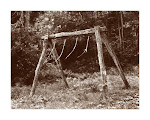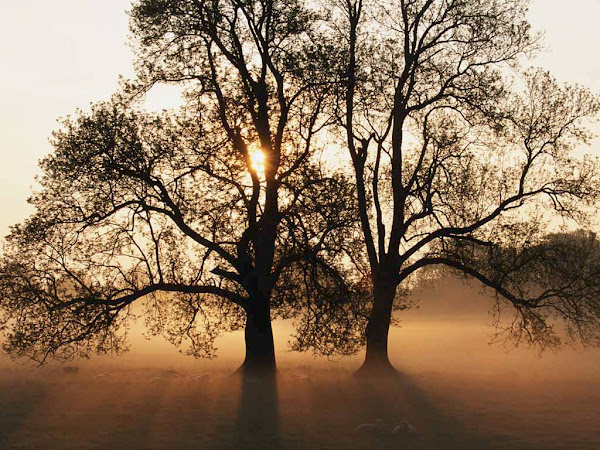When Creation Places a Collect Call
The Peace of Wild Things - By Wendell Berry
When despair for the world grows in me
and I wake in the night at the least sound
in fear of what my life and my children’s lives may be,
I go and lie down where the wood drake
rests in his beauty on the water, and the great heron feeds.
I come into the peace of wild things
who do not tax their lives with forethought
of grief. I come into the presence of still water.
And I feel above me the day-blind stars
waiting with their light. For a time
I rest in the grace of the world, and am free.
We are created beings. Despite our current preference for the “ideas of life” over its very real presence, there is a place between the earth and our bodies that is the terrain of our humanness. Daily, without fanfare, the sensuous reality of this creation offers itself up and over to us. We neglect its dazzling gestures at our own peril for its mystifying topography is the language of the somatic soul and thus the song of humans. The created order communes with us. Do we hear and respond to its rich and luxurious affluence of beauty?
As a Jesus follower, I grasp the oft felt groaning sighs of a world caught up in a moral drama. Antagonists and protagonists rise and fall & we humans dominate time as if it were our own. Is there a much more worthy cosmology in which to plant our fragile souls clothed in such permeable and sentient cloth? Might the created order, nay the very Creator Himself have not merely embedded an inner beauty in this realm we call life but one much more tangibly mundane, accessible, astonishingly ordinary and yet extravagant in its embracing glory?
As modernism’s massive under taking & narrative wanes in the West, it appears to be building steam in the East (i.e. China, Korea). Caught up in the ways of reason and logic, capitalism and consumption become the center of humankind’s endeavors and the relegated inferior position of the created order appears present & honored only in esoteric conversations & works by so-called radical ecologists or earth worshipping new agers.
Dave Abrams, an exquisite reporter of nature’s etymology sees this penchant for pushing the experiential world away from our daily lives as tragic and dangerous to the earth’s future. Whether we wish to step outside of or live above and beyond the daily realm of the created order, or take charge of its ways through some technological utopian dream, we still remain hidden from “the shadowed wonder and wildness of earthly existence.”
For Abrams, this overt disempowering posture is at its core much more primal and unacknowledged. Science and the promises of a bio engineer and his/her predictions of “mastery” over the forces of nature have planted in them a parallel dystopian nightmare as well.He wonders if this eschewing of nature’s true place in our lives is much more about our deeply felt knowing that indeed we are in relationship with a powerfully dangerously beautiful lover. The observable fact that those closest to us pass from this realm & are no longer here in our presence, is one sign that earthly reality is overwhelmingly confusing. Abrams profoundly articulates, “To exist as a body is to be constrained from being everything, and so exposed and susceptible to all that is not oneself- able to be tripped up at any moment by the inscrutability of a pattern one cannot fathom.” For believers, this mystery is sacramental. However, many of my brothers and sisters in the faith do not acknowledge this conundrum thusly. Nature is still a bag of candy, a flower shop with an 800 #. Or it is only a fallen space where powers and principalities prevail. Thus, the power and presence of the created order on & in our lives goes underground and unconsciously speaks from our shadowed pathologies.
Holding life at bay in some detached manner allows me to manipulate its offering as if variables in some equation. I call the earth’s bounty “resources” as if their manifestation as a tree or a hillside or a far off planet were merely evolutionary predictability or cosmic whim. Might there be an intended shared experience our Creator set into the very fibers of our being? Is there a possible kinship with Creation that calls out of us a much more gracious and humbled enfolding? Is David Abrams (author of the Spell of the Sensuous & Becoming Animal) correct when he bemoans how long we have cut ourselves off from nature’s intention for a "participatory" life with our senses?”
Ancient cultures did not have the option of the deluded aloofness from nature we moderns have. For us, long periods of time may pass between a devastating flood like the one in New Orleans or Japan’s tsunami. Nature’s fury, as the phrase goes, is made manifest generally in areas more remote than our protected urban centers. So when something of such magnitude dares to jump the walls, break down the gates or storm the Bastille, as if were, we are befuddled and taken aback. How could we not have seen that coming? Who is to blame for such a catastrophe? Have we not conquered the puny presence of nature?
Dave Abrams comes from a new bread of anthropologists, ecologists and philosophers who ponder the relationship between humankind and the environment in which humans live out their lives. He contends we have taken refuge in the false hope of technology and science. I am not sure his personal perspective on spirituality but from his writings it would appear that at the least, he sees monotheism and its tendencies for a detached all powerful deity distressed at the mess humankind has made with creation as a less than imaginative way to engage this world. Religion’s history with science, truth seeking no matter the cost, and the fear of the frighteningly new, rarely brings to a people embedded in an ancient story a narrative of grace, openness, and mercy. So much of Abrams critique is indeed insightful on some level.
What is so moving in the works of Abrams is his venture into the created realm with descriptives that are poetic and magical. It is clear he deeply honors the created order (my words not his). Out of this place of deep respect and awe, Abrams prophetically calls out what has been lost in the Cartesian obsession with thought and knowing as an epistemology that only comes when one distances himself from nature. On the contrary, for Abrams, the real is only experienced as it is encountered in participation with the created order. There is no experience above or outside the realm in which our bodies abide. He says that his work is “foremost to the matter of becoming more deeply human.”
As I daily practice resurrection, I am discovering the resplendent beauty offered to me when I regard myself as a “part of” something bigger than myself. By acknowledging my smallness I am able to, like Abrams, to find myself in the rich immensity of the created order. Let me end with a few lines from one of Abram’s works.
This is from his diary following one of his daily hikes into the wilderness.
For how many hours have I been stumbling through the folded terrain? Pink spires leer down at my tiny form as I walk along the edges of gullies, slipping into and out of fractaled ravines….I’ve seen no trace of humankind, however, just a jackrabbit darting between the bushes, and what I think was a kestrel hovering against the cliffs.
I left the car by the side of the highway this morning, drawn out of the vehicle by fascination with what my eyes were seeing. I slung a strip of cloth dangling a bottle of water over my shoulder and wandered out into this impossible landscape. The longer I wandered the wider the scape seemed to grow. By noon I was thoroughly , blissfully lost in the sculpted immensity of this place- a small two legged insect making its way between the toes of giants…How hopelessly insignificant the human is-a speck lost and blundering through the limitless depth of the macrocosm, drinking from the voluminous air, dazzled by reflected rays and drawn upright by a hundred flesh toned cliffs and slopes…Such encounters with the outrageous scale of the larger Body we inhabit bring a shuddering humility, yet they can also release an unexpected intuition of safety, a sense of being held and sustained by powers far larger than anything we can comprehend. A safety that comes from being merely an anonymous part of What Is, from feeling oneself as a clutch of sodden soil and hollow bones with the same wind blowing through them that gusts the high ridges. From being in intimate alliance with the bedrock. It’s the weird security of realizing that one is part of something so damned huge…And so I‘m in the grasp of this strange, skin tingling sensation of my own insignificance as I climb the steep slope of a butte.
Let me close for now with my poetic mentor.
“Whether we and our politicians know it or not, Nature is party to all our deals and decisions, and she has more votes, a longer memory, and a sterner sense of justice than we do.” ― Wendell Berry






No comments:
Post a Comment